Constitutional Law: Judicial Review, Proportionality and Human Rights
VerifiedAdded on 2020/06/03
|8
|2300
|122
Essay
AI Summary
This essay delves into the significance of proportionality in enhancing judicial review within the realm of constitutional law. It begins by defining constitutional law, judicial review, and the concept of proportionality. The essay highlights the evolution of judicial review, emphasizing the grounds upon which it is based, including irrationality, illegality, and proportionality. The core of the essay examines how proportionality has enhanced judicial review, referencing key case laws such as Pham v Secretary of State for the Home Department and the Danish Bottles case. It also analyzes a case scenario involving Eddie Torial, a campaigner detained under the Terrorism Act 2000, and provides legal advice based on the Human Rights Act 1998, particularly Article 10 concerning freedom of expression. The essay concludes with a decision in favor of Eddie Torial, emphasizing the importance of upholding human rights and freedom of expression. The essay underscores that proportionality plays a vital role in ensuring that legal actions are justified and proportionate to their objectives, particularly in cases involving human rights.
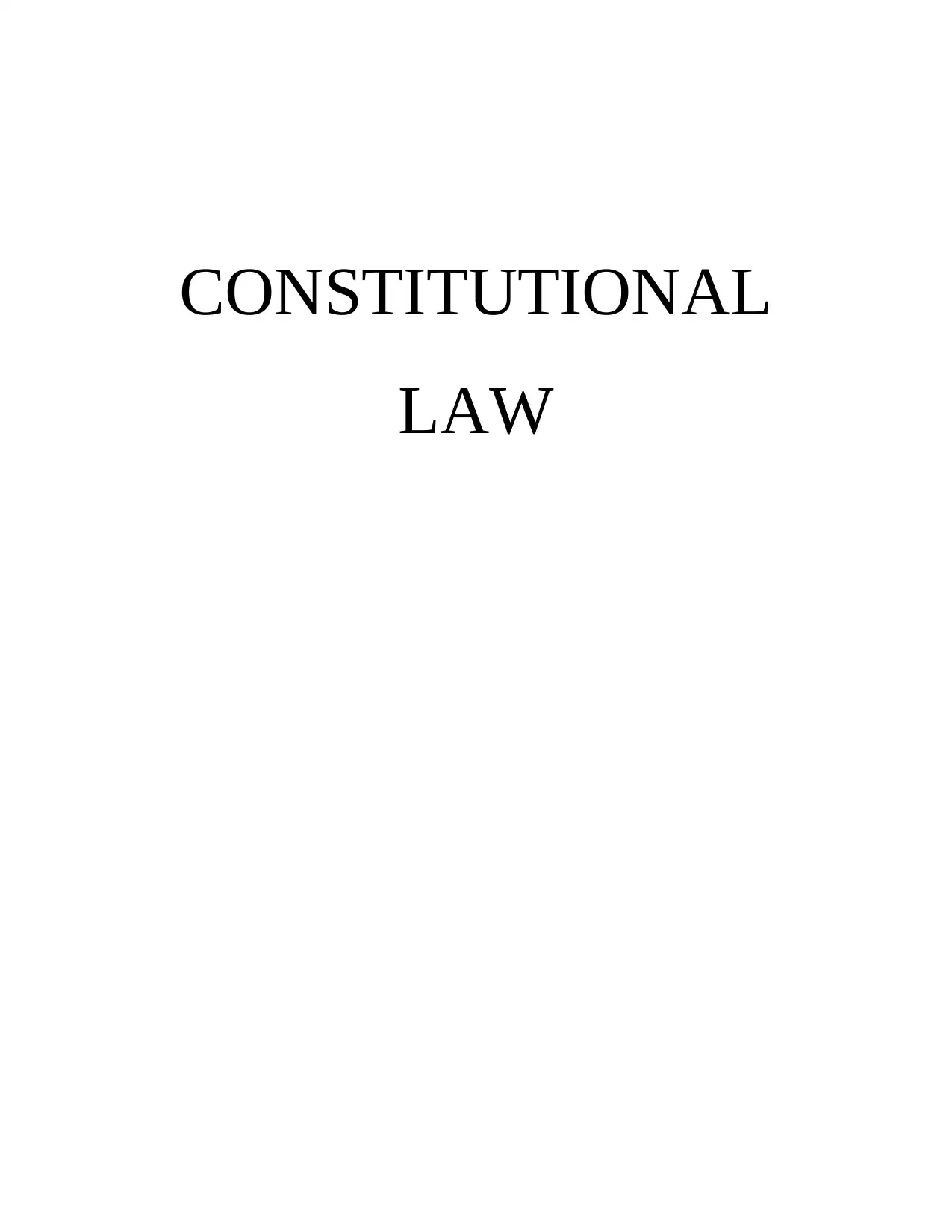
CONSTITUTIONAL
LAW
LAW
Paraphrase This Document
Need a fresh take? Get an instant paraphrase of this document with our AI Paraphraser
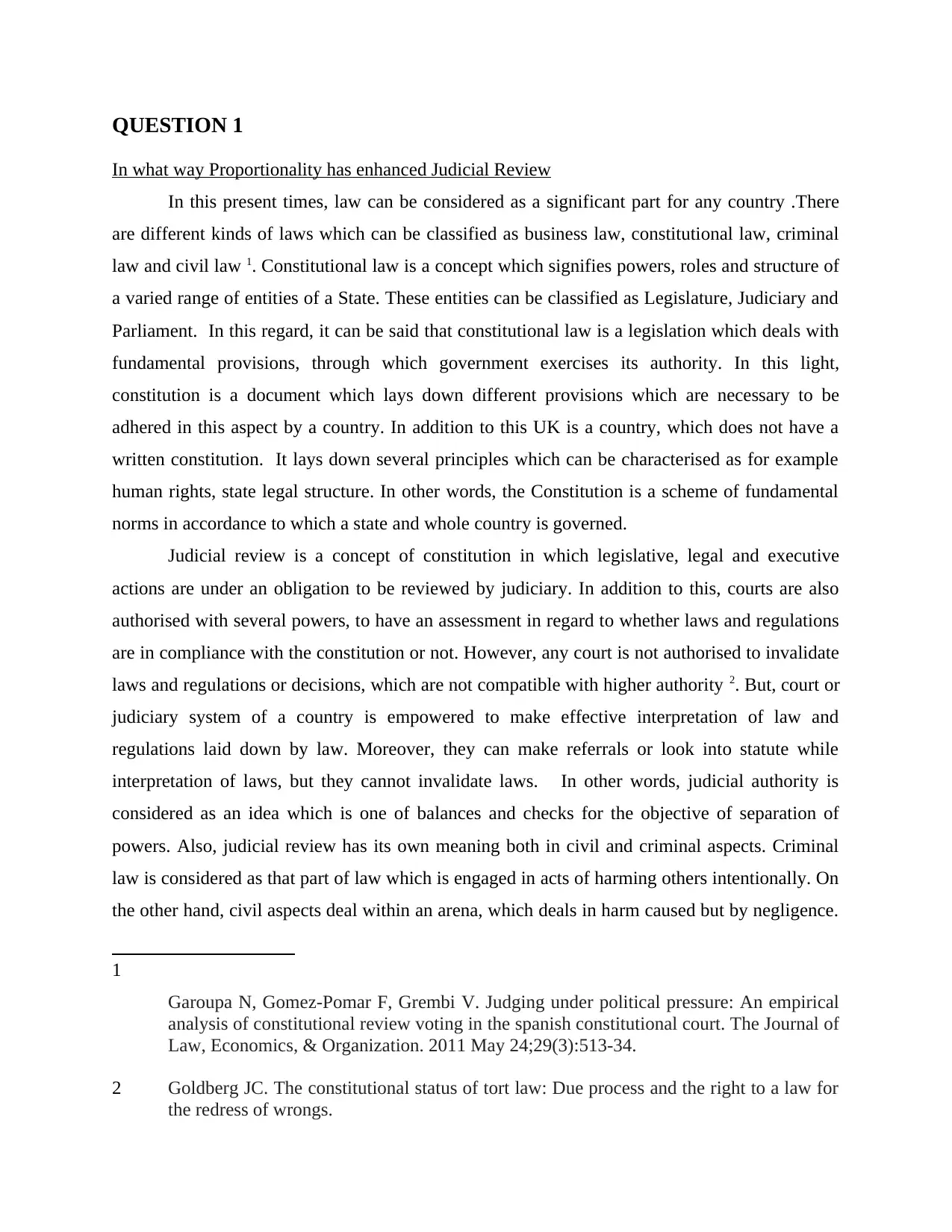
QUESTION 1
In what way Proportionality has enhanced Judicial Review
In this present times, law can be considered as a significant part for any country .There
are different kinds of laws which can be classified as business law, constitutional law, criminal
law and civil law 1. Constitutional law is a concept which signifies powers, roles and structure of
a varied range of entities of a State. These entities can be classified as Legislature, Judiciary and
Parliament. In this regard, it can be said that constitutional law is a legislation which deals with
fundamental provisions, through which government exercises its authority. In this light,
constitution is a document which lays down different provisions which are necessary to be
adhered in this aspect by a country. In addition to this UK is a country, which does not have a
written constitution. It lays down several principles which can be characterised as for example
human rights, state legal structure. In other words, the Constitution is a scheme of fundamental
norms in accordance to which a state and whole country is governed.
Judicial review is a concept of constitution in which legislative, legal and executive
actions are under an obligation to be reviewed by judiciary. In addition to this, courts are also
authorised with several powers, to have an assessment in regard to whether laws and regulations
are in compliance with the constitution or not. However, any court is not authorised to invalidate
laws and regulations or decisions, which are not compatible with higher authority 2. But, court or
judiciary system of a country is empowered to make effective interpretation of law and
regulations laid down by law. Moreover, they can make referrals or look into statute while
interpretation of laws, but they cannot invalidate laws. In other words, judicial authority is
considered as an idea which is one of balances and checks for the objective of separation of
powers. Also, judicial review has its own meaning both in civil and criminal aspects. Criminal
law is considered as that part of law which is engaged in acts of harming others intentionally. On
the other hand, civil aspects deal within an arena, which deals in harm caused but by negligence.
1
Garoupa N, Gomez-Pomar F, Grembi V. Judging under political pressure: An empirical
analysis of constitutional review voting in the spanish constitutional court. The Journal of
Law, Economics, & Organization. 2011 May 24;29(3):513-34.
2 Goldberg JC. The constitutional status of tort law: Due process and the right to a law for
the redress of wrongs.
In what way Proportionality has enhanced Judicial Review
In this present times, law can be considered as a significant part for any country .There
are different kinds of laws which can be classified as business law, constitutional law, criminal
law and civil law 1. Constitutional law is a concept which signifies powers, roles and structure of
a varied range of entities of a State. These entities can be classified as Legislature, Judiciary and
Parliament. In this regard, it can be said that constitutional law is a legislation which deals with
fundamental provisions, through which government exercises its authority. In this light,
constitution is a document which lays down different provisions which are necessary to be
adhered in this aspect by a country. In addition to this UK is a country, which does not have a
written constitution. It lays down several principles which can be characterised as for example
human rights, state legal structure. In other words, the Constitution is a scheme of fundamental
norms in accordance to which a state and whole country is governed.
Judicial review is a concept of constitution in which legislative, legal and executive
actions are under an obligation to be reviewed by judiciary. In addition to this, courts are also
authorised with several powers, to have an assessment in regard to whether laws and regulations
are in compliance with the constitution or not. However, any court is not authorised to invalidate
laws and regulations or decisions, which are not compatible with higher authority 2. But, court or
judiciary system of a country is empowered to make effective interpretation of law and
regulations laid down by law. Moreover, they can make referrals or look into statute while
interpretation of laws, but they cannot invalidate laws. In other words, judicial authority is
considered as an idea which is one of balances and checks for the objective of separation of
powers. Also, judicial review has its own meaning both in civil and criminal aspects. Criminal
law is considered as that part of law which is engaged in acts of harming others intentionally. On
the other hand, civil aspects deal within an arena, which deals in harm caused but by negligence.
1
Garoupa N, Gomez-Pomar F, Grembi V. Judging under political pressure: An empirical
analysis of constitutional review voting in the spanish constitutional court. The Journal of
Law, Economics, & Organization. 2011 May 24;29(3):513-34.
2 Goldberg JC. The constitutional status of tort law: Due process and the right to a law for
the redress of wrongs.
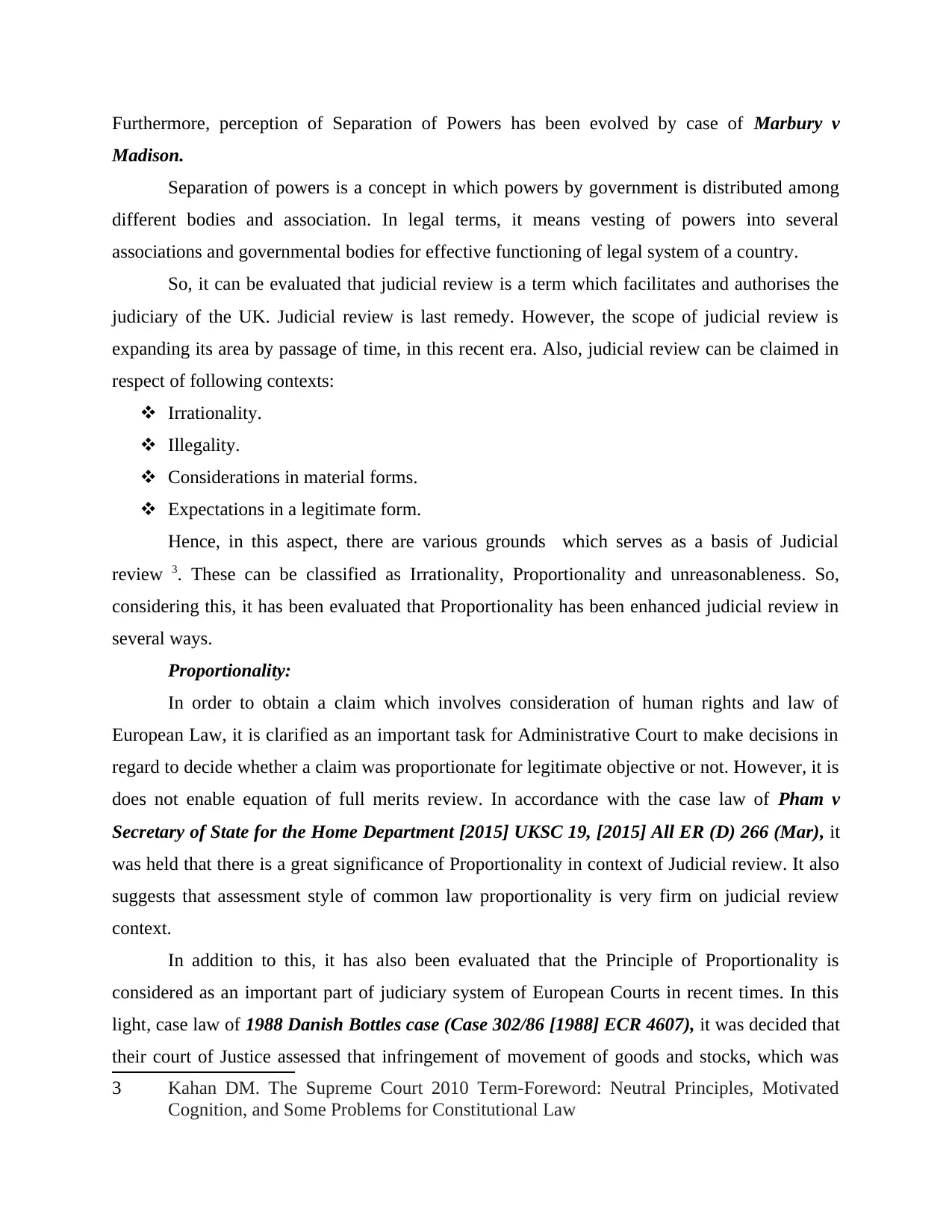
Furthermore, perception of Separation of Powers has been evolved by case of Marbury v
Madison.
Separation of powers is a concept in which powers by government is distributed among
different bodies and association. In legal terms, it means vesting of powers into several
associations and governmental bodies for effective functioning of legal system of a country.
So, it can be evaluated that judicial review is a term which facilitates and authorises the
judiciary of the UK. Judicial review is last remedy. However, the scope of judicial review is
expanding its area by passage of time, in this recent era. Also, judicial review can be claimed in
respect of following contexts:
Irrationality.
Illegality.
Considerations in material forms.
Expectations in a legitimate form.
Hence, in this aspect, there are various grounds which serves as a basis of Judicial
review 3. These can be classified as Irrationality, Proportionality and unreasonableness. So,
considering this, it has been evaluated that Proportionality has been enhanced judicial review in
several ways.
Proportionality:
In order to obtain a claim which involves consideration of human rights and law of
European Law, it is clarified as an important task for Administrative Court to make decisions in
regard to decide whether a claim was proportionate for legitimate objective or not. However, it is
does not enable equation of full merits review. In accordance with the case law of Pham v
Secretary of State for the Home Department [2015] UKSC 19, [2015] All ER (D) 266 (Mar), it
was held that there is a great significance of Proportionality in context of Judicial review. It also
suggests that assessment style of common law proportionality is very firm on judicial review
context.
In addition to this, it has also been evaluated that the Principle of Proportionality is
considered as an important part of judiciary system of European Courts in recent times. In this
light, case law of 1988 Danish Bottles case (Case 302/86 [1988] ECR 4607), it was decided that
their court of Justice assessed that infringement of movement of goods and stocks, which was
3 Kahan DM. The Supreme Court 2010 Term-Foreword: Neutral Principles, Motivated
Cognition, and Some Problems for Constitutional Law
Madison.
Separation of powers is a concept in which powers by government is distributed among
different bodies and association. In legal terms, it means vesting of powers into several
associations and governmental bodies for effective functioning of legal system of a country.
So, it can be evaluated that judicial review is a term which facilitates and authorises the
judiciary of the UK. Judicial review is last remedy. However, the scope of judicial review is
expanding its area by passage of time, in this recent era. Also, judicial review can be claimed in
respect of following contexts:
Irrationality.
Illegality.
Considerations in material forms.
Expectations in a legitimate form.
Hence, in this aspect, there are various grounds which serves as a basis of Judicial
review 3. These can be classified as Irrationality, Proportionality and unreasonableness. So,
considering this, it has been evaluated that Proportionality has been enhanced judicial review in
several ways.
Proportionality:
In order to obtain a claim which involves consideration of human rights and law of
European Law, it is clarified as an important task for Administrative Court to make decisions in
regard to decide whether a claim was proportionate for legitimate objective or not. However, it is
does not enable equation of full merits review. In accordance with the case law of Pham v
Secretary of State for the Home Department [2015] UKSC 19, [2015] All ER (D) 266 (Mar), it
was held that there is a great significance of Proportionality in context of Judicial review. It also
suggests that assessment style of common law proportionality is very firm on judicial review
context.
In addition to this, it has also been evaluated that the Principle of Proportionality is
considered as an important part of judiciary system of European Courts in recent times. In this
light, case law of 1988 Danish Bottles case (Case 302/86 [1988] ECR 4607), it was decided that
their court of Justice assessed that infringement of movement of goods and stocks, which was
3 Kahan DM. The Supreme Court 2010 Term-Foreword: Neutral Principles, Motivated
Cognition, and Some Problems for Constitutional Law
⊘ This is a preview!⊘
Do you want full access?
Subscribe today to unlock all pages.

Trusted by 1+ million students worldwide
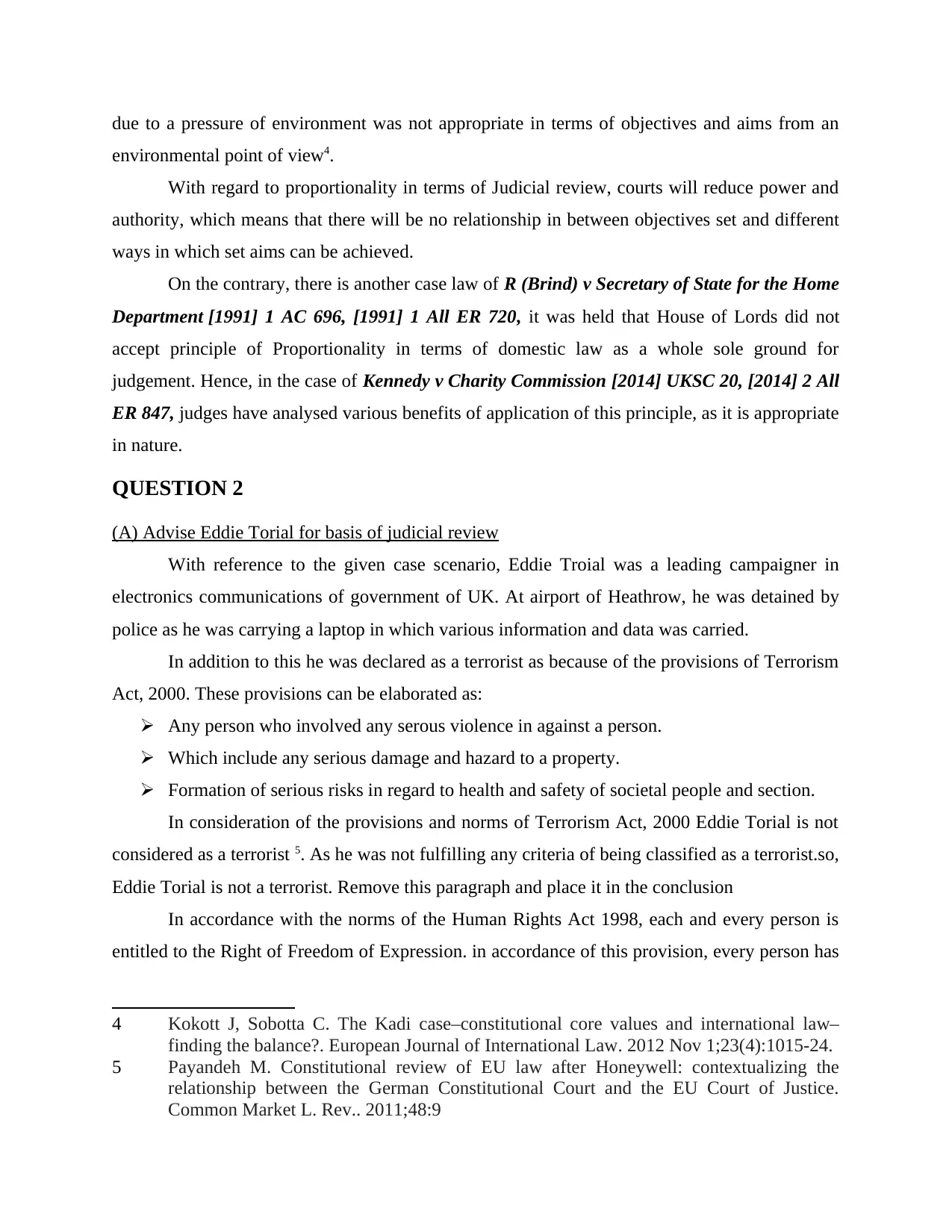
due to a pressure of environment was not appropriate in terms of objectives and aims from an
environmental point of view4.
With regard to proportionality in terms of Judicial review, courts will reduce power and
authority, which means that there will be no relationship in between objectives set and different
ways in which set aims can be achieved.
On the contrary, there is another case law of R (Brind) v Secretary of State for the Home
Department [1991] 1 AC 696, [1991] 1 All ER 720, it was held that House of Lords did not
accept principle of Proportionality in terms of domestic law as a whole sole ground for
judgement. Hence, in the case of Kennedy v Charity Commission [2014] UKSC 20, [2014] 2 All
ER 847, judges have analysed various benefits of application of this principle, as it is appropriate
in nature.
QUESTION 2
(A) Advise Eddie Torial for basis of judicial review
With reference to the given case scenario, Eddie Troial was a leading campaigner in
electronics communications of government of UK. At airport of Heathrow, he was detained by
police as he was carrying a laptop in which various information and data was carried.
In addition to this he was declared as a terrorist as because of the provisions of Terrorism
Act, 2000. These provisions can be elaborated as:
Any person who involved any serous violence in against a person.
Which include any serious damage and hazard to a property.
Formation of serious risks in regard to health and safety of societal people and section.
In consideration of the provisions and norms of Terrorism Act, 2000 Eddie Torial is not
considered as a terrorist 5. As he was not fulfilling any criteria of being classified as a terrorist.so,
Eddie Torial is not a terrorist. Remove this paragraph and place it in the conclusion
In accordance with the norms of the Human Rights Act 1998, each and every person is
entitled to the Right of Freedom of Expression. in accordance of this provision, every person has
4 Kokott J, Sobotta C. The Kadi case–constitutional core values and international law–
finding the balance?. European Journal of International Law. 2012 Nov 1;23(4):1015-24.
5 Payandeh M. Constitutional review of EU law after Honeywell: contextualizing the
relationship between the German Constitutional Court and the EU Court of Justice.
Common Market L. Rev.. 2011;48:9
environmental point of view4.
With regard to proportionality in terms of Judicial review, courts will reduce power and
authority, which means that there will be no relationship in between objectives set and different
ways in which set aims can be achieved.
On the contrary, there is another case law of R (Brind) v Secretary of State for the Home
Department [1991] 1 AC 696, [1991] 1 All ER 720, it was held that House of Lords did not
accept principle of Proportionality in terms of domestic law as a whole sole ground for
judgement. Hence, in the case of Kennedy v Charity Commission [2014] UKSC 20, [2014] 2 All
ER 847, judges have analysed various benefits of application of this principle, as it is appropriate
in nature.
QUESTION 2
(A) Advise Eddie Torial for basis of judicial review
With reference to the given case scenario, Eddie Troial was a leading campaigner in
electronics communications of government of UK. At airport of Heathrow, he was detained by
police as he was carrying a laptop in which various information and data was carried.
In addition to this he was declared as a terrorist as because of the provisions of Terrorism
Act, 2000. These provisions can be elaborated as:
Any person who involved any serous violence in against a person.
Which include any serious damage and hazard to a property.
Formation of serious risks in regard to health and safety of societal people and section.
In consideration of the provisions and norms of Terrorism Act, 2000 Eddie Torial is not
considered as a terrorist 5. As he was not fulfilling any criteria of being classified as a terrorist.so,
Eddie Torial is not a terrorist. Remove this paragraph and place it in the conclusion
In accordance with the norms of the Human Rights Act 1998, each and every person is
entitled to the Right of Freedom of Expression. in accordance of this provision, every person has
4 Kokott J, Sobotta C. The Kadi case–constitutional core values and international law–
finding the balance?. European Journal of International Law. 2012 Nov 1;23(4):1015-24.
5 Payandeh M. Constitutional review of EU law after Honeywell: contextualizing the
relationship between the German Constitutional Court and the EU Court of Justice.
Common Market L. Rev.. 2011;48:9
Paraphrase This Document
Need a fresh take? Get an instant paraphrase of this document with our AI Paraphraser
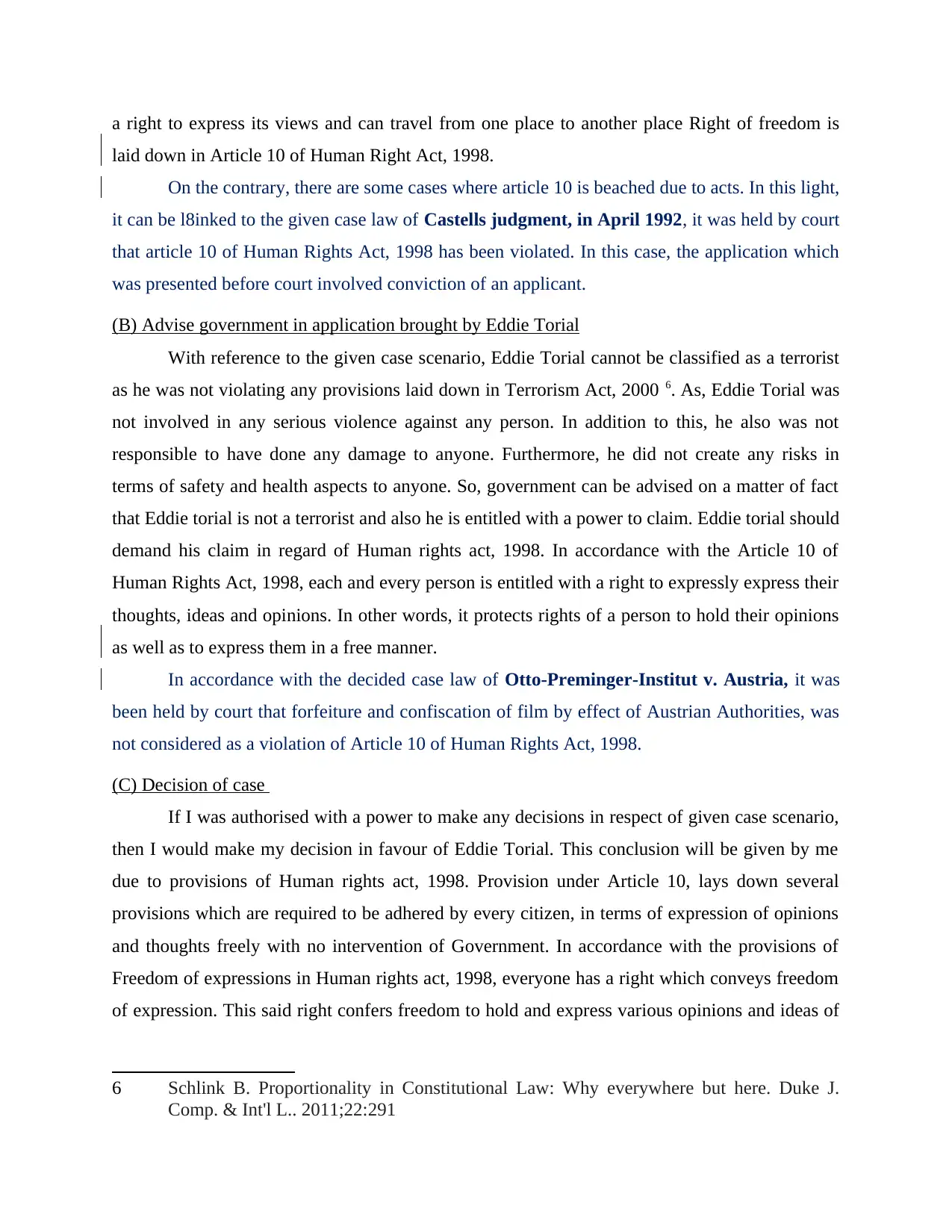
a right to express its views and can travel from one place to another place Right of freedom is
laid down in Article 10 of Human Right Act, 1998.
On the contrary, there are some cases where article 10 is beached due to acts. In this light,
it can be l8inked to the given case law of Castells judgment, in April 1992, it was held by court
that article 10 of Human Rights Act, 1998 has been violated. In this case, the application which
was presented before court involved conviction of an applicant.
(B) Advise government in application brought by Eddie Torial
With reference to the given case scenario, Eddie Torial cannot be classified as a terrorist
as he was not violating any provisions laid down in Terrorism Act, 2000 6. As, Eddie Torial was
not involved in any serious violence against any person. In addition to this, he also was not
responsible to have done any damage to anyone. Furthermore, he did not create any risks in
terms of safety and health aspects to anyone. So, government can be advised on a matter of fact
that Eddie torial is not a terrorist and also he is entitled with a power to claim. Eddie torial should
demand his claim in regard of Human rights act, 1998. In accordance with the Article 10 of
Human Rights Act, 1998, each and every person is entitled with a right to expressly express their
thoughts, ideas and opinions. In other words, it protects rights of a person to hold their opinions
as well as to express them in a free manner.
In accordance with the decided case law of Otto-Preminger-Institut v. Austria, it was
been held by court that forfeiture and confiscation of film by effect of Austrian Authorities, was
not considered as a violation of Article 10 of Human Rights Act, 1998.
(C) Decision of case
If I was authorised with a power to make any decisions in respect of given case scenario,
then I would make my decision in favour of Eddie Torial. This conclusion will be given by me
due to provisions of Human rights act, 1998. Provision under Article 10, lays down several
provisions which are required to be adhered by every citizen, in terms of expression of opinions
and thoughts freely with no intervention of Government. In accordance with the provisions of
Freedom of expressions in Human rights act, 1998, everyone has a right which conveys freedom
of expression. This said right confers freedom to hold and express various opinions and ideas of
6 Schlink B. Proportionality in Constitutional Law: Why everywhere but here. Duke J.
Comp. & Int'l L.. 2011;22:291
laid down in Article 10 of Human Right Act, 1998.
On the contrary, there are some cases where article 10 is beached due to acts. In this light,
it can be l8inked to the given case law of Castells judgment, in April 1992, it was held by court
that article 10 of Human Rights Act, 1998 has been violated. In this case, the application which
was presented before court involved conviction of an applicant.
(B) Advise government in application brought by Eddie Torial
With reference to the given case scenario, Eddie Torial cannot be classified as a terrorist
as he was not violating any provisions laid down in Terrorism Act, 2000 6. As, Eddie Torial was
not involved in any serious violence against any person. In addition to this, he also was not
responsible to have done any damage to anyone. Furthermore, he did not create any risks in
terms of safety and health aspects to anyone. So, government can be advised on a matter of fact
that Eddie torial is not a terrorist and also he is entitled with a power to claim. Eddie torial should
demand his claim in regard of Human rights act, 1998. In accordance with the Article 10 of
Human Rights Act, 1998, each and every person is entitled with a right to expressly express their
thoughts, ideas and opinions. In other words, it protects rights of a person to hold their opinions
as well as to express them in a free manner.
In accordance with the decided case law of Otto-Preminger-Institut v. Austria, it was
been held by court that forfeiture and confiscation of film by effect of Austrian Authorities, was
not considered as a violation of Article 10 of Human Rights Act, 1998.
(C) Decision of case
If I was authorised with a power to make any decisions in respect of given case scenario,
then I would make my decision in favour of Eddie Torial. This conclusion will be given by me
due to provisions of Human rights act, 1998. Provision under Article 10, lays down several
provisions which are required to be adhered by every citizen, in terms of expression of opinions
and thoughts freely with no intervention of Government. In accordance with the provisions of
Freedom of expressions in Human rights act, 1998, everyone has a right which conveys freedom
of expression. This said right confers freedom to hold and express various opinions and ideas of
6 Schlink B. Proportionality in Constitutional Law: Why everywhere but here. Duke J.
Comp. & Int'l L.. 2011;22:291
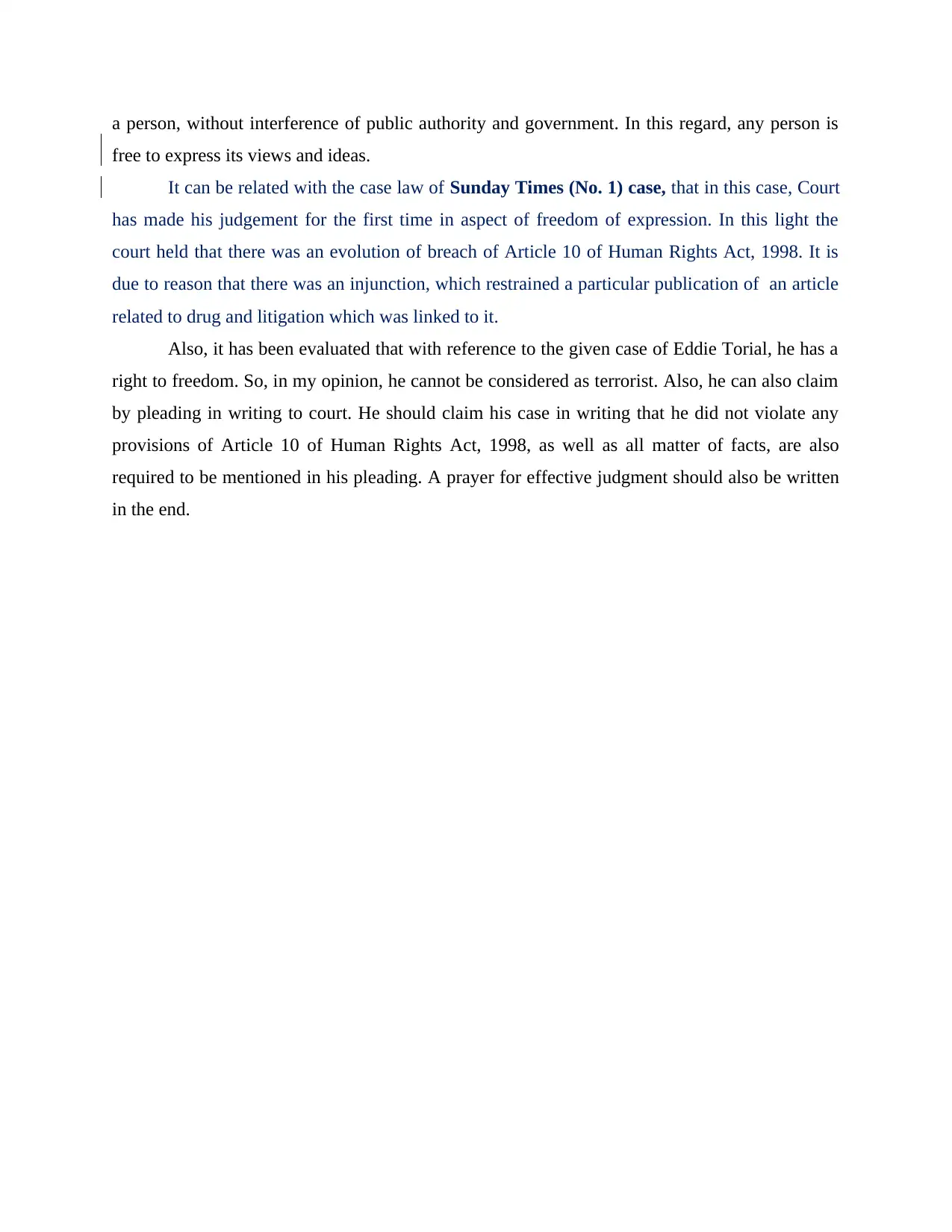
a person, without interference of public authority and government. In this regard, any person is
free to express its views and ideas.
It can be related with the case law of Sunday Times (No. 1) case, that in this case, Court
has made his judgement for the first time in aspect of freedom of expression. In this light the
court held that there was an evolution of breach of Article 10 of Human Rights Act, 1998. It is
due to reason that there was an injunction, which restrained a particular publication of an article
related to drug and litigation which was linked to it.
Also, it has been evaluated that with reference to the given case of Eddie Torial, he has a
right to freedom. So, in my opinion, he cannot be considered as terrorist. Also, he can also claim
by pleading in writing to court. He should claim his case in writing that he did not violate any
provisions of Article 10 of Human Rights Act, 1998, as well as all matter of facts, are also
required to be mentioned in his pleading. A prayer for effective judgment should also be written
in the end.
free to express its views and ideas.
It can be related with the case law of Sunday Times (No. 1) case, that in this case, Court
has made his judgement for the first time in aspect of freedom of expression. In this light the
court held that there was an evolution of breach of Article 10 of Human Rights Act, 1998. It is
due to reason that there was an injunction, which restrained a particular publication of an article
related to drug and litigation which was linked to it.
Also, it has been evaluated that with reference to the given case of Eddie Torial, he has a
right to freedom. So, in my opinion, he cannot be considered as terrorist. Also, he can also claim
by pleading in writing to court. He should claim his case in writing that he did not violate any
provisions of Article 10 of Human Rights Act, 1998, as well as all matter of facts, are also
required to be mentioned in his pleading. A prayer for effective judgment should also be written
in the end.
⊘ This is a preview!⊘
Do you want full access?
Subscribe today to unlock all pages.

Trusted by 1+ million students worldwide
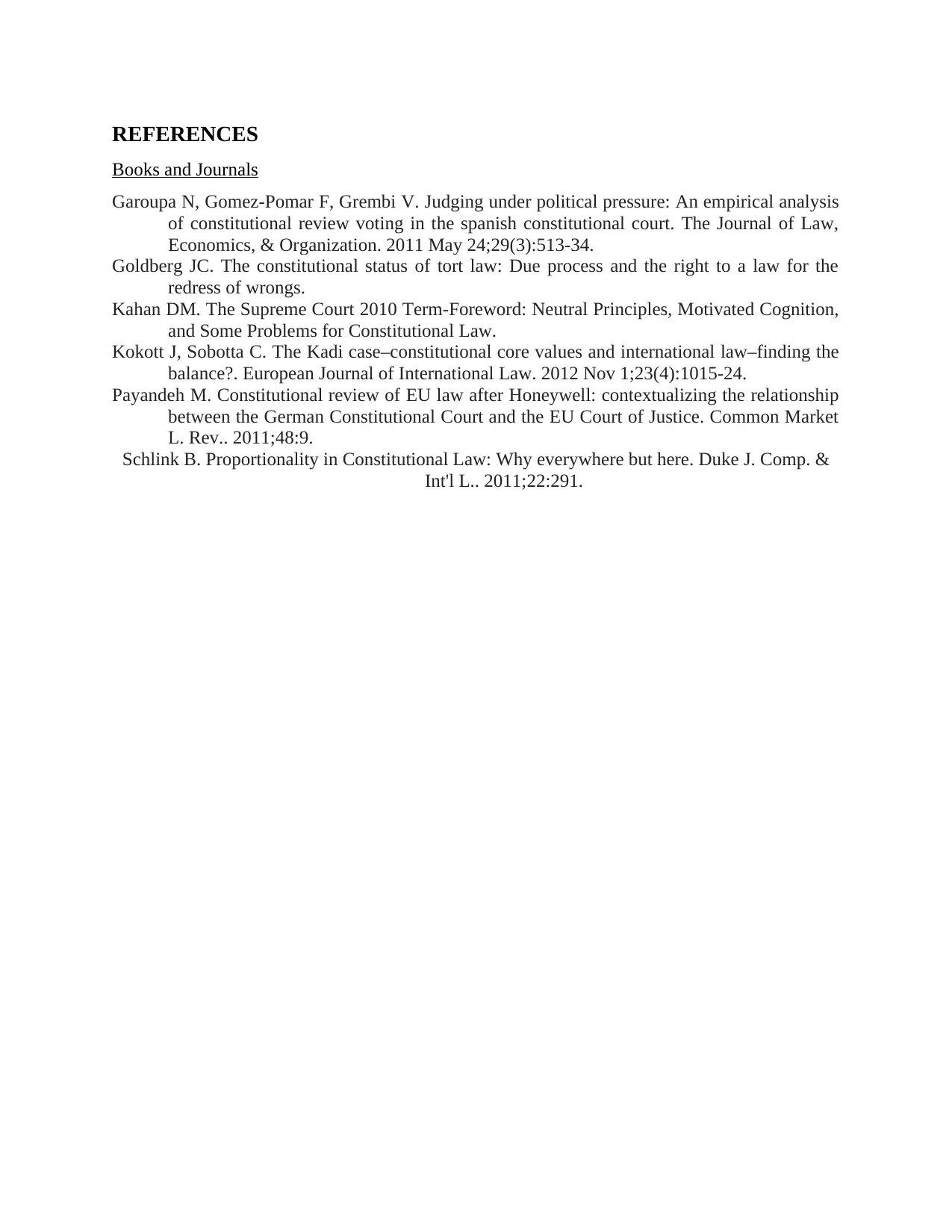
REFERENCES
Books and Journals
Garoupa N, Gomez-Pomar F, Grembi V. Judging under political pressure: An empirical analysis
of constitutional review voting in the spanish constitutional court. The Journal of Law,
Economics, & Organization. 2011 May 24;29(3):513-34.
Goldberg JC. The constitutional status of tort law: Due process and the right to a law for the
redress of wrongs.
Kahan DM. The Supreme Court 2010 Term-Foreword: Neutral Principles, Motivated Cognition,
and Some Problems for Constitutional Law.
Kokott J, Sobotta C. The Kadi case–constitutional core values and international law–finding the
balance?. European Journal of International Law. 2012 Nov 1;23(4):1015-24.
Payandeh M. Constitutional review of EU law after Honeywell: contextualizing the relationship
between the German Constitutional Court and the EU Court of Justice. Common Market
L. Rev.. 2011;48:9.
Schlink B. Proportionality in Constitutional Law: Why everywhere but here. Duke J. Comp. &
Int'l L.. 2011;22:291.
Books and Journals
Garoupa N, Gomez-Pomar F, Grembi V. Judging under political pressure: An empirical analysis
of constitutional review voting in the spanish constitutional court. The Journal of Law,
Economics, & Organization. 2011 May 24;29(3):513-34.
Goldberg JC. The constitutional status of tort law: Due process and the right to a law for the
redress of wrongs.
Kahan DM. The Supreme Court 2010 Term-Foreword: Neutral Principles, Motivated Cognition,
and Some Problems for Constitutional Law.
Kokott J, Sobotta C. The Kadi case–constitutional core values and international law–finding the
balance?. European Journal of International Law. 2012 Nov 1;23(4):1015-24.
Payandeh M. Constitutional review of EU law after Honeywell: contextualizing the relationship
between the German Constitutional Court and the EU Court of Justice. Common Market
L. Rev.. 2011;48:9.
Schlink B. Proportionality in Constitutional Law: Why everywhere but here. Duke J. Comp. &
Int'l L.. 2011;22:291.
Paraphrase This Document
Need a fresh take? Get an instant paraphrase of this document with our AI Paraphraser

1 out of 8
Related Documents
Your All-in-One AI-Powered Toolkit for Academic Success.
+13062052269
info@desklib.com
Available 24*7 on WhatsApp / Email
![[object Object]](/_next/static/media/star-bottom.7253800d.svg)
Unlock your academic potential
Copyright © 2020–2026 A2Z Services. All Rights Reserved. Developed and managed by ZUCOL.





